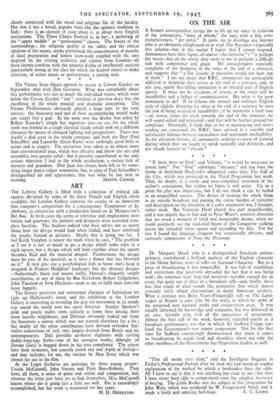ON THE AIR
A SURREY correspondent invites me to lift up my voice in criticism of the announcers, "most of whom," she says, with a fine com- prehensiveness, "are awful." It pains me to disoblige any listener who is so obviously enlightened as to read The Spectator—especially this column—but in this matter I regret that I cannot respond. Announcers have their lapses, of course—the intrusive "r" is perhaps the worst—but on the whole they seem to me to perform a difficult task with competence and grace. My correspondent especially complains of the dropping of the voice at the end of a sentence, and suggests that "a few lessons in elocution would not hurt any of them." I am not aware that B.B.C. announcers are particularly addicted to dropping their voices at the end of a sentence, and, in any case, surely this falling intonation is an integral part of English speech. It must not be overdone, of course, or the result will be inaudibility and a failure of communication. But what is the poor announcer to do? If he follows the natural and ordinary English style of slightly dropping his voice at the end of a sentence he runs the risk of being accused of inaudibility ; if he maintains a level tone —or, worse, raises the pitch towards the end of the sentence—he will sound stilted and unnatural ; and that will be further ground for complaint. Personally, I think that so far as announcing and news- reading are concerned, the B.B.C. have arrived at a sensible and satisfactory balance between naturalness and maximum intelligibility. As for elocution lessons, all announcers undergo a course of training during which they are taught to speak naturally -and distinctly, and not (thank heaven) to " clocute."
"If there were no God," said Voltaire, "it would be necessary to invent him." For "God" substitute "dictator," and you have the theme of Archibald MacLeish's allegorical radio play, The Fall of the City, which was produced in the Third Programme last week. That, no doubt, is a crude and over-simplified statement of the author's conception, but within its limits it will serve. Up to a point the play was impressive, but I do not think it can be hailed as an unqualified success. The device of treating the whole thing as an outside broadcast and putting the entire burden of narrative and description on the shoulders of a radio announcer was, I thought, rather weak. But Valentine Dyall played this part magnificently, and it was mainly due to him and to Peter Watts's sensitive direction that we owed a moment of vivid and memorable drama, when we could positively see the mail-clad figure of the Conqueror stalking across the crowded, silent square and ascending the dais. For the rest I found the language eloquent but occasionally obscure, and curiously reminiscent of Piers the Plowman.
Dr. Margaret Mead, who is a distinguished American anthro- pologist, contributed a brilliant analysis of the English character to the Home Service series of talks on National Character. But as a piece of broadcasting it was lamentable. It was full of stumblings and corrections that positively obtruded the fact that it was being read ; the sentences were long and involved—suitable enough for an essay, but quite out of place in a broadcast talk—and, finally, there was that touch of what sounds like pomposity (but which almost certainly isn't) which characterises so many American speakers. What a contrast was Brian Vesey-Fitzgerald's talk on The Land- scapes of Britain (a poor title, by the way), in which he spoke of the proposed new national parks and conservation areas. It was equally informed by knowledge and sympathy, but was delivered in an easy, friendly style, with all the appearance of spontaneity. Almost the best talk of the week, however, regarded purely as a broadcast performance, was that in which Sir Stafford Cripps out- lined the Government's new export programme. Not for the first time Sir Stafford convincingly demonstrated that when it comes to broadcasting he stands head and shoulders above not only the other members of the Government but Opposition leaders as well.
"That all seems very clear," said the Intelligent Inquirer in Friday's Professional Portrait after he (and we) had heard an erudite explanation of the method by which a bookmaker fixes the odds. All I have to say is that it was anything but clear to me ; but then I have never been able to comprehend even the simplest mysteries of betting. The Little Bookie was the subject of this programme by John Watt, which was produced by W. Farquharson Small, and it made a lively and amusing half-hour. L. C. LLOYD.


































 Previous page
Previous page